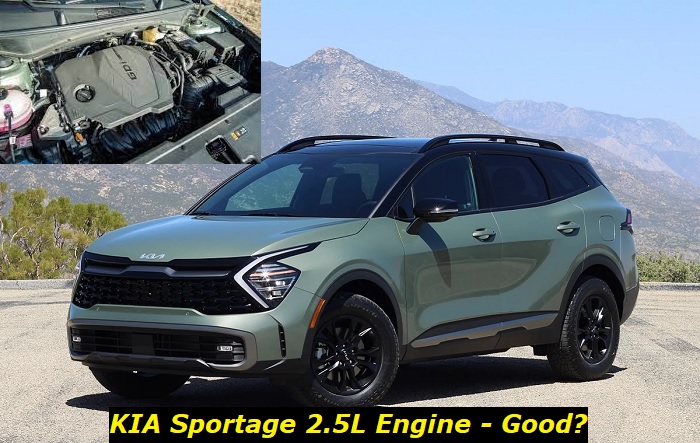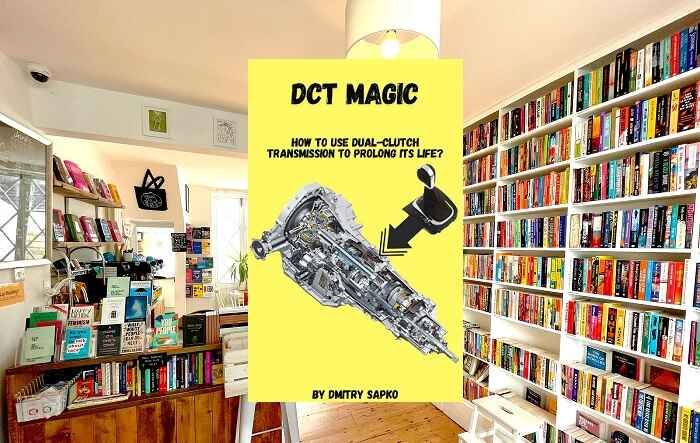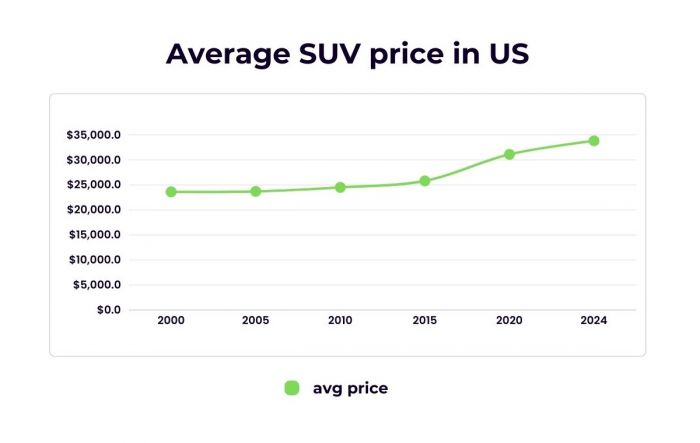KIA and Hyundai vehicles keep getting more and more attention in the world. They are practical, offer fair prices, great tech, and they also look good. Modern Korean cars have already turned completely to Smartstream engines. They are efficient, economical, and pretty tough in terms of reliability. So far, great news for the new KIA Sportage and those who want to buy it.
Today we'll tell you about the most popular engine for the new KIA Sportage - the base 2.5L gasoline engine (G4KN). We'll cover its advantages and also some problems it may have. Thanks to new technologies, KIA managed to offer a really cool engine. It's basically the same base engine that powers the new Hyundai Tucson, but we should make sure it's also reliable and isn't going to throw lots of problems.

Key facts and my opinion about the engine
- Production years: 2019-now
- Average lifespan of G4KN: 180,000-200,000 miles
- Fuel supply type: combined injection (GDI+MPI)
- Power range: 194 hp
- Fuel efficiency: above average
- Engine block material: aluminum
- Engine reliability score: medium
- The most common problems: catalytic converter destroying the cylinders, unknown lifespan of the thermostat, lifters require only good oil.
Key facts about the 2.5L engine in the new Sportage
So, the KIA Sportage uses the non-turbocharged 2.5L Smartstream engine that has been manufactured since 2020. We still don't know everything we want to know about this engine because there aren't enough historical records available for investigation. Also, reports about problems are pretty rare because all engines are still young and don't have a lot of miles on them yet.
But we still have something to tell you about these engines. Mostly, we like the G4KN engine for its smooth work and great fuel efficiency. It's pretty good to drive - it feels like a good modern turbo powerplant and gives access to high torque. It feels great and won't disappoint you. And this is the only pure gasoline engine in the new Sportage.
Here's what you should know about it:
- the engine is a naturally aspirated powerplant with 4 cylinders, 2.5 liters of displacement, 187 horsepower, and 178 lb-ft of torque;
- this is the Smartstream G2.5 GDI engine with the direct injection system and also the additional port injection system to deal with the carbon buildup;
- the engine is all-aluminum, the interesting thing in specs is its compression which is 13 and it's really a lot for a gas unit;
- the timing system is driven by the chain, phasers are used on both the intake and exhaust camshaft which is pretty standard nowadays;
- the engine is mated to a solid 8-speed automatic transmission, one of the best choices among all compact SUVs on the market;
- the engine is not super technological, so it should be really durable and non-problematic, but we can't say that for sure now;
- the manufacturer claims that you will be able to get about 25 MPG in the city and 32 MPG on highways in this car which is not bad at all.
So, the engine is pretty simple and looks like a long-lasting powerplant. Engineers didn't have the task to squeeze as much power out of it as possible. But the offered power is still enough for active driving and you won't feel something is wrong with the capabilities of the engine.
Two other options of powerplants for this vehicle are two hybrid versions with a much smaller 1.6L Turbo engine and different types of electric equipment. So, the 2.5L is the only solid option for those who want a simple and reliable vehicle and don't care much about fuel consumption.
The transmission seems durable. It's not a DCT or CVT, it's just a simple and traditional automatic transmission with good flexibility. If it fails at 150K miles, you can repair it and make it go another hundred thousand or something like that.
How long will the 2.5L Smartstream engine live in your Sportage?
This is a really durable version of the engine for a very solid vehicle. You will get at least 200,000 miles from it if the engine is maintained properly and repaired when needed. Of course, negligence and aggressive driving will reduce the durability of the engine and probably attract first problems while the vehicle is still under warranty.
KIA offers 5 years or 60,000 miles warranty for the G4KN engine and other units in the powerplant. But we can say for sure that you will not have a lot of problems within this period unless you are killing this unit by yourself.
The durability could be even better if you provided this engine with proper TLC. Good parts, regular maintenance, and also careful use would do the trick. Unfortunately, Smartstream engines will still fail because of pretty questionable valve timing mechanisms and some other flaws in their construction. But, among all new non-turbo and non-hybrid engines, these ones look pretty good.
What are the common problems with the 2.5L engine in the Sportage?
Although we don't know a lot of information about the issues that happen with these engines at high mileage, we can look at other engines with the same technologies from Hyundai and KIA. Also, we can talk to mechanics and ask the to predict which parts and units in these powerplant will cause more problems.
And here's what we could find:
1. Traditional catalytic converter problem
The G4KN engine still has this annoying problem with the catalytic converter that is placed too close to the cylinder block. In case the converter gets ruined, the small ceramic elements may easily be thrown into cylinders. They will scratch the cylinders and may even clog the oil channels eventually.
This problem has been there in many KIA engines for years and it's still not addressed properly. That's why paying attention to the health of your cat converter is extremely important.
2. Some new technologies don't look very solid
Although, overall, this engine is pretty good and solid, some technologies seem like being too fresh and poorly checked. For example, the electronic thermostat is a cool idea that can flexibly control the engine temperature. But we are afraid it can fail unexpectedly after working for 5-6 years and the engine will overheat quickly.
Also, the oil pump is adjustable and can regulate the oil pressure according to RPMs, temperature, and other factors. This helps the engine be more efficient, but again, the durability is simply not known. If it fails, the engine may completely break down in several minutes of driving.
3. Oil-type craziness
We've seen hundreds of comments on KIA forums about the wrong oil type that KIA recommends for its Sportage. It's 0w20 which is said to be "just like water", so many drivers are just afraid of using this type of oil. They choose the 5w30 options which seems a better choice for them.
But you should understand that engineers have checked this engine with the 0w20 and they guarantee it will be just fine with this type of oil. Please just stick to the manufacturer's recommendations and never change the oil just because you like another type. This will kill your engine much faster.
5w30 oil has a higher viscosity rate and it will just not be able to lubricate some parts of this engine. Also, the oil pump will not work completely correctly.
4. Potential high-mileage problems
We can think of timing chain problems just like in all other KIA engines with the chain in their timing systems. It will stretch a little and start rattling at 80-100 thousand miles. Replacing the chain here is not going to cost you a little money.
Also, after 100K miles, the engine will start throwing different kinds of minor issues that should be addressed promptly. If neglected, these issues will fast turn into major problems and kill the engine much earlier than you may expect.
What to do to prolong the life of the 2.5L engine in the Sportage?
Prolonging the life of the engine is not easy at all. You need to give this vehicle a lot of TLC. Go to the dealer and have the car inspected once you suspect there is a problem with the engine. Better you spend some hours of your time than overlook some minor issue that will grow into a fatal problem in just some months.
At 80-100 thousand miles be ready to pay for chain replacement. Also, at this mileage, you may need to replace the oil pump and the thermostat. Pay attention to the catalytic converter. After the car hits the 100,000-mile mark, the converter is at risk of failing. And you will not want to drive your car with a dying converter because this will likely kill the engine.
Overall, the 2.5L engine doesn't seem bad. It still has its pinch of salt but we would say it's one of the best simple engines available in today's compact SUVs. If you are searching for a practical and reliable powerplant, this is the version for you.
About the authors
The CarAraC research team is composed of seasoned auto mechanics and automotive industry professionals, including individuals with advanced degrees and certifications in their field. Our team members boast prestigious credentials, reflecting their extensive knowledge and skills. These qualifications include: IMI: Institute of the Motor Industry, ASE-Certified Master Automobile Technicians; Coventry University, Graduate of MA in Automotive Journalism; Politecnico di Torino, Italy, MS Automotive Engineering; Ss. Cyril and Methodius University in Skopje, Mechanical University in Skopje; TOC Automotive College; DHA Suffa University, Department of Mechanical Engineering






Add comment